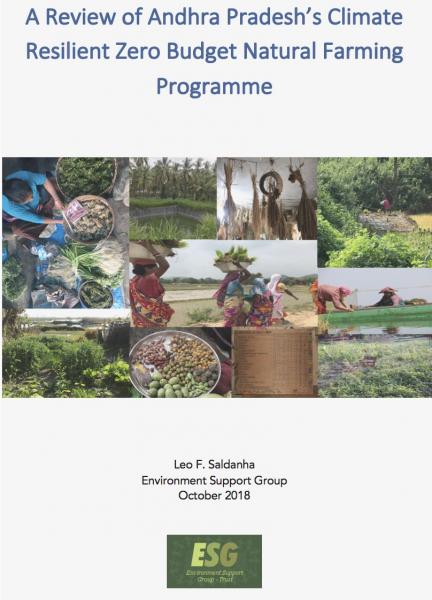A Review Of Andhra Pradesh’s Climate Resilient Zero Budget Natural Farming Programme
An enquiry into an unprecedented transformation to natural farming globally.
16 October 2018
Downloads:
A Review of AP CRZBNF – Saldanha -Oct 2018 – 3.5 MB

On the occassion of World Food Day, 2018, Environment Support Group is happy to share “A Review of Andhra Pradesh’s Climate Resilient Zero Budget Natural Farming Programme”, authored by Leo F. Saldanha.
In the last several years, the Indian State of Andhra Pradesh has devoted considerable portions of its developmental plans to the endorsement of extensive agricultural reform. Most cogently originating in the celebrated Community Managed Sustainable Agriculture (CMSA) initiative, the State has had a fairly propitious history of involvement with sustainable and organic farming methods. In 2015-2016, the government of Andhra Pradesh announced its decision to replace the CMSA initiative with a new, more comprehensive agricultural reform program dubbed, Climate Resilient Zero-Budget Natural Farming (CRZBNF).
Proactively promoted, the program quickly gathered considerable media attention both domestically, in India, as well as internationally with organs of the United Nations and global financial institutions heaping praise upon the initative. In the years since it was announced, the program has also secured commitments by major players in global finance as well as by philanthropic initatives for considerable amounts of funding.
The author’s motivation to critically examine the program originated from two observations. First, the program was being promoted as a kind of miraculous solution to the numerous issues of Indian agriculture as well as to the unchecked deterioration of the quality of life of Indian farmers. When things appear to be good to be true, they usually are. As the following examination of this program shall show, CRZBNF is riddled with inconsistencies that would leave any well wisher of its objectives reasonably concerned. Second, for a program in whose very name the phrase ‘Zero-budget’ alludes to the low cost of investment required by the farming ideology being propounded, the thousands of crores of rupees being raised for it’s implementation deserve some justification as well as transparent and accountable utilization.
Thus far however, the program’s functioning and objectives have remained remarkably opaque. Beyond its’ advertised benefits and successes, little information is available on the public domain. Until recently, even less than is currently available existed. The change reflects the efforts and pressures exerted by concerned individuals and organisations through formal inquiries about the massive public undertaking. Responses have so far not been as forthcoming as would be appropriate. As shall be shown, the proponents of the program –barring a few individuals- have by and large been exceedingly reluctant to engage with relevant sections of civil society and public opinion.
Such behavior in the implementation of public projects is demonstrably undemocratic and, at times, in direct violation of our constitutional commitment to due process and accountability. Furthermore, policies and undertakings that have been similarly imposed upon the public in the past have often been seen to fail to provide the promised deliverables. When deliverables have been achieved in the short term, longer-term repercussions often emerge that in many ways outweight the achieved benefits. A readily available instance would be the so-called Green Revolution that has had such an adverse impact on the health and productivity of our nation’s farmland.
It is the hope of the Author of this paper that this attempt to draw attention to the issues within CRZBNF will not be construed as a politically or otherwise motivated instance of vindictiveness. Rather, it is hoped that this analysis may alert all those concerned with the success of the project to a few of the ways in which it could be better ensured. Certainly, our farmers shall bear the brunt of our haste’s repercussions.
community outreach,campaigns,biodiversity,publications,brinjal,APPI,Climate Resilient,Natural Farming,RySS,SIFF,Subhash Palekar,UNEP,Zero Budget

